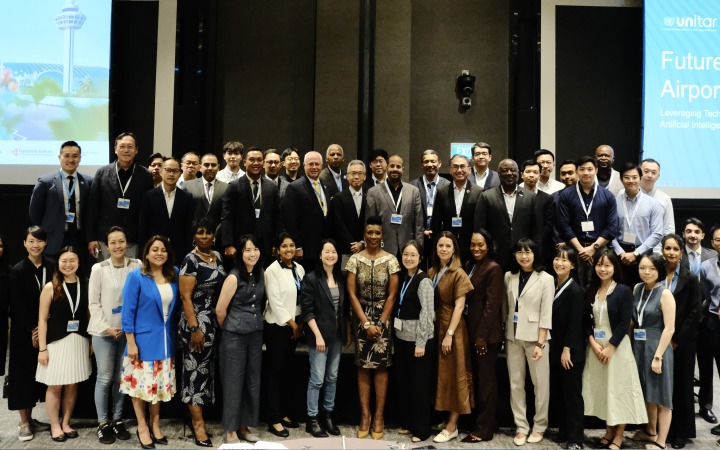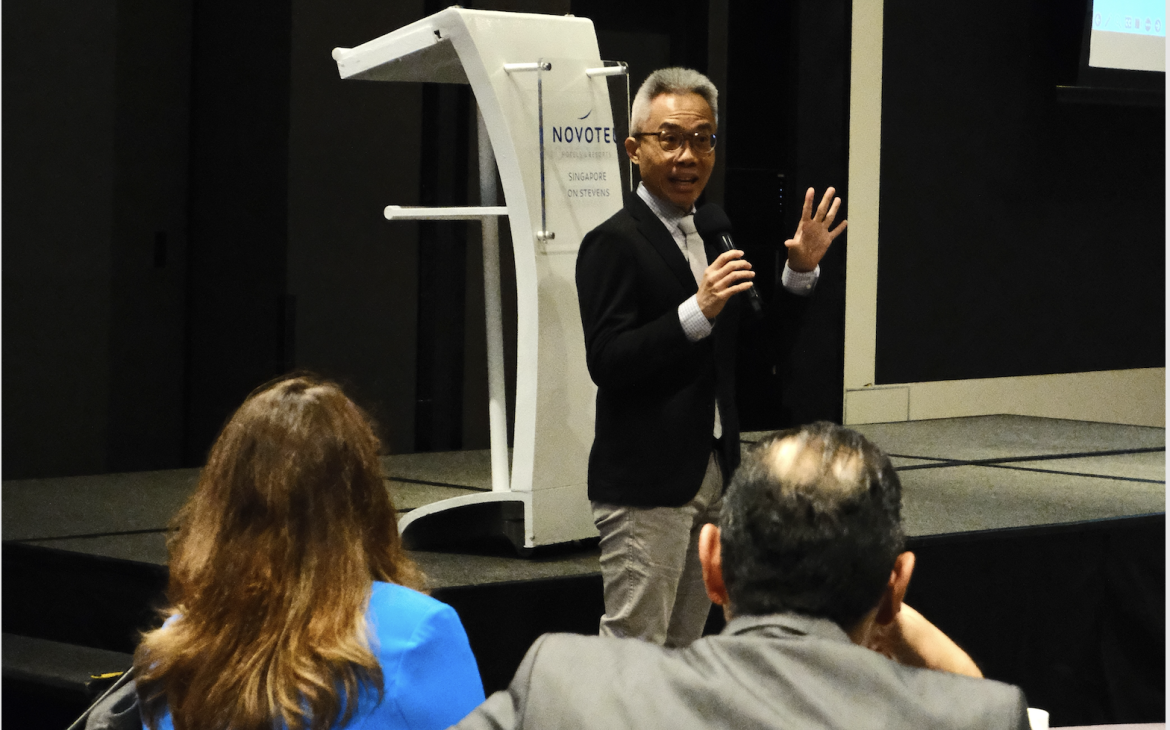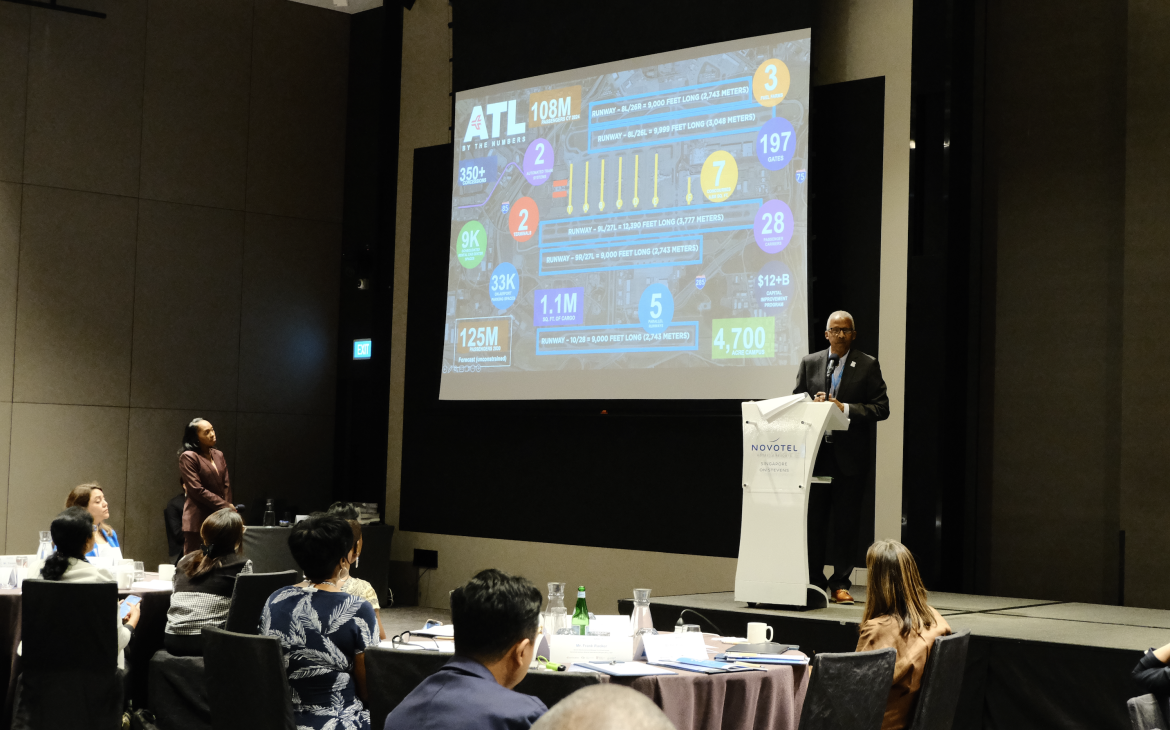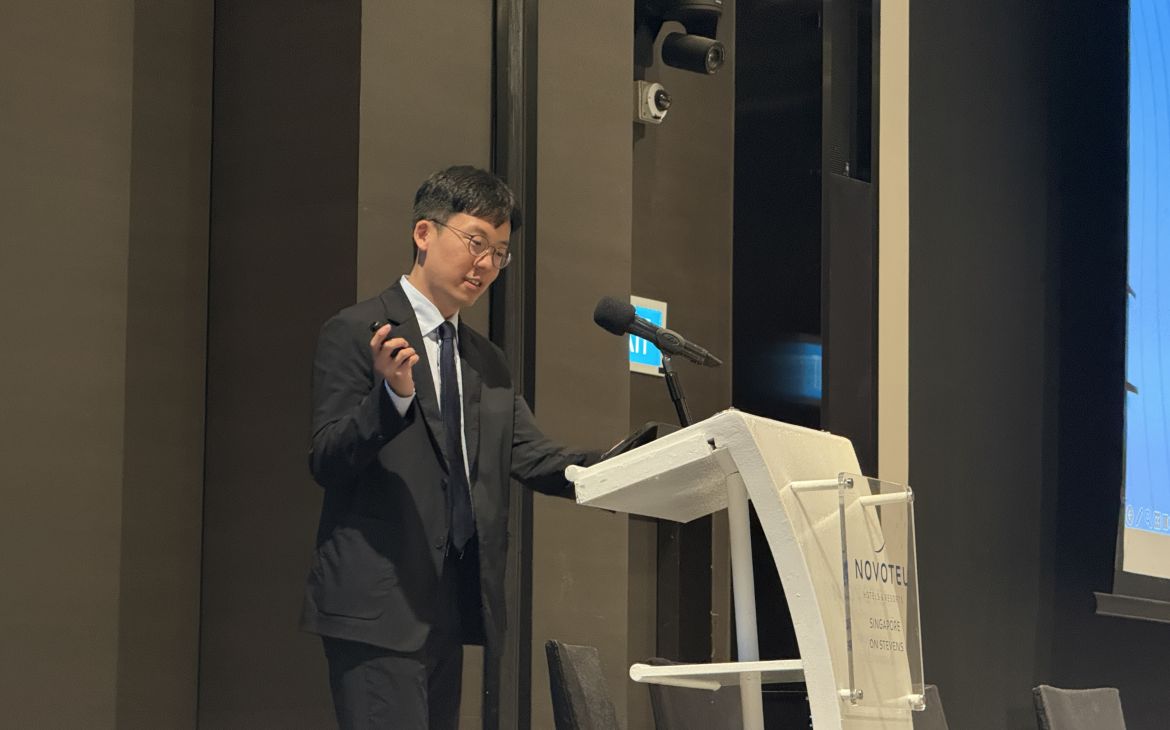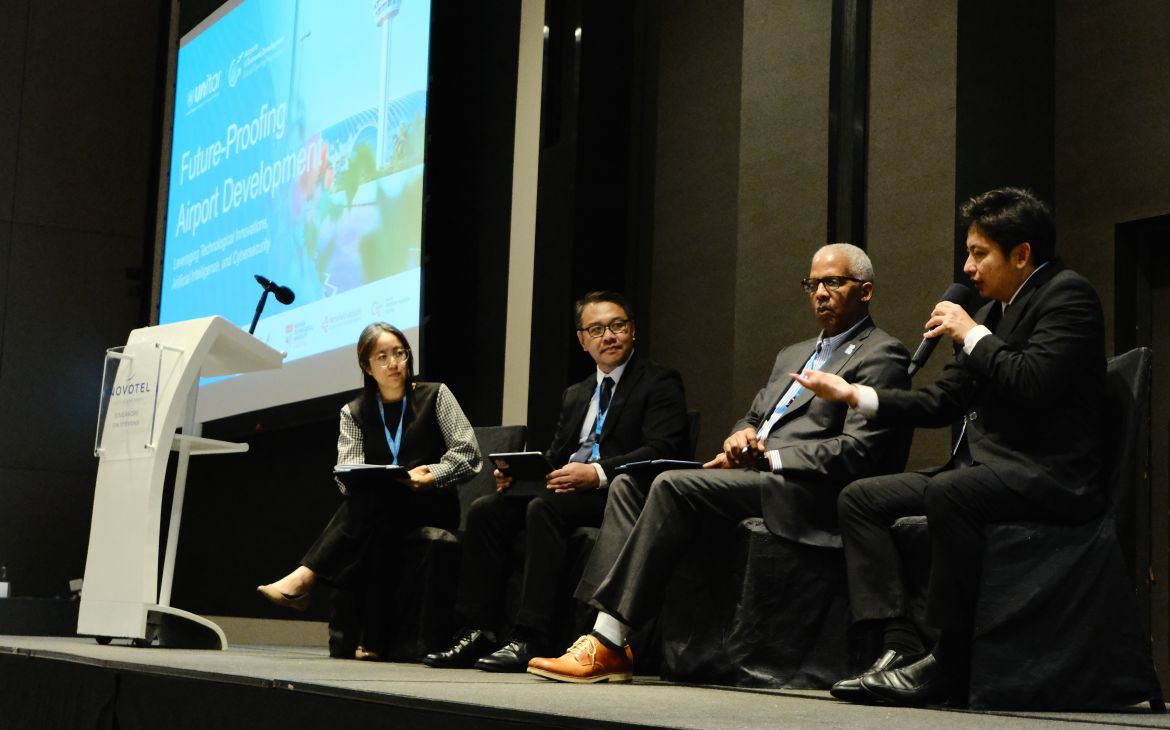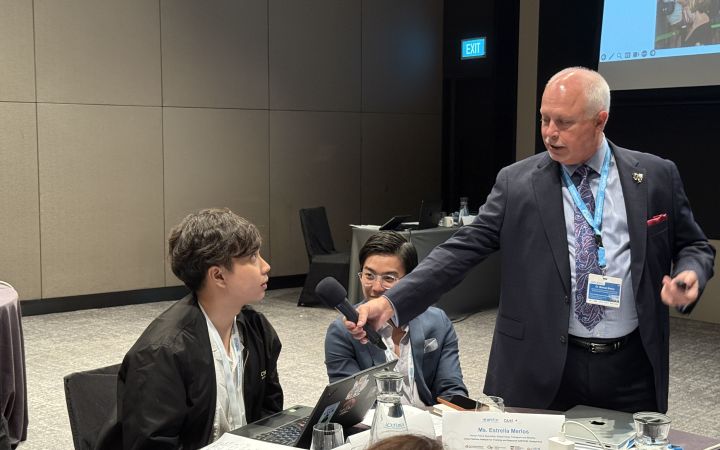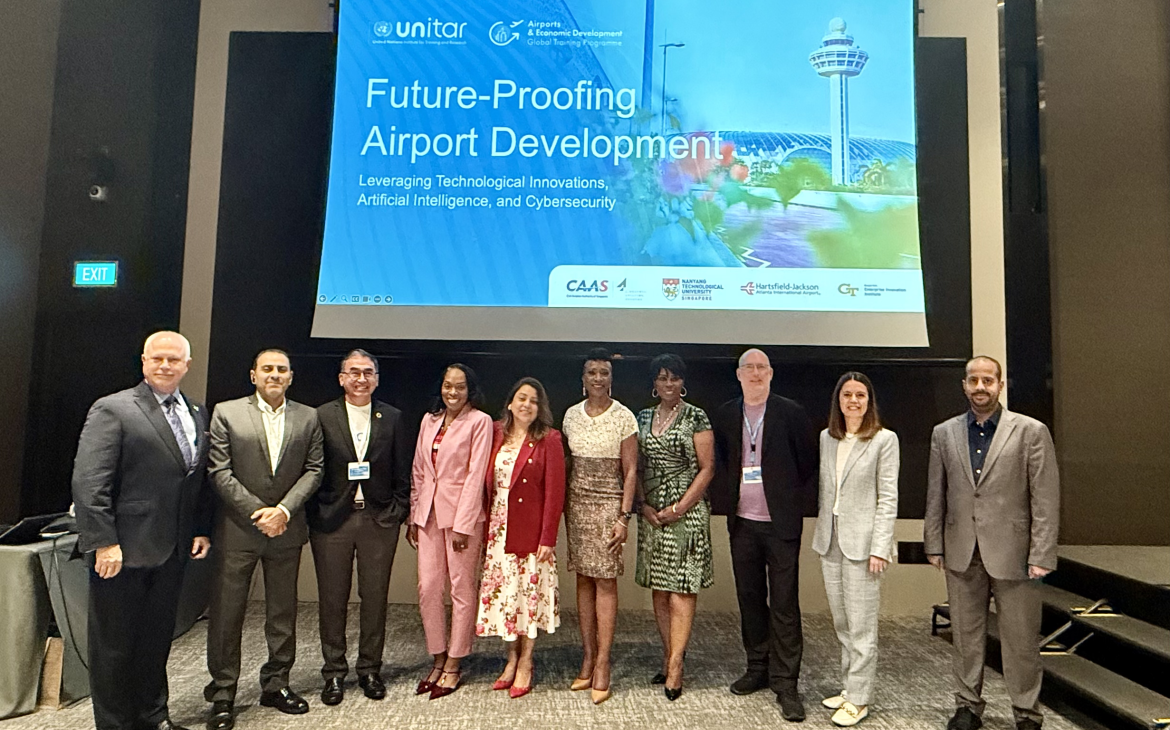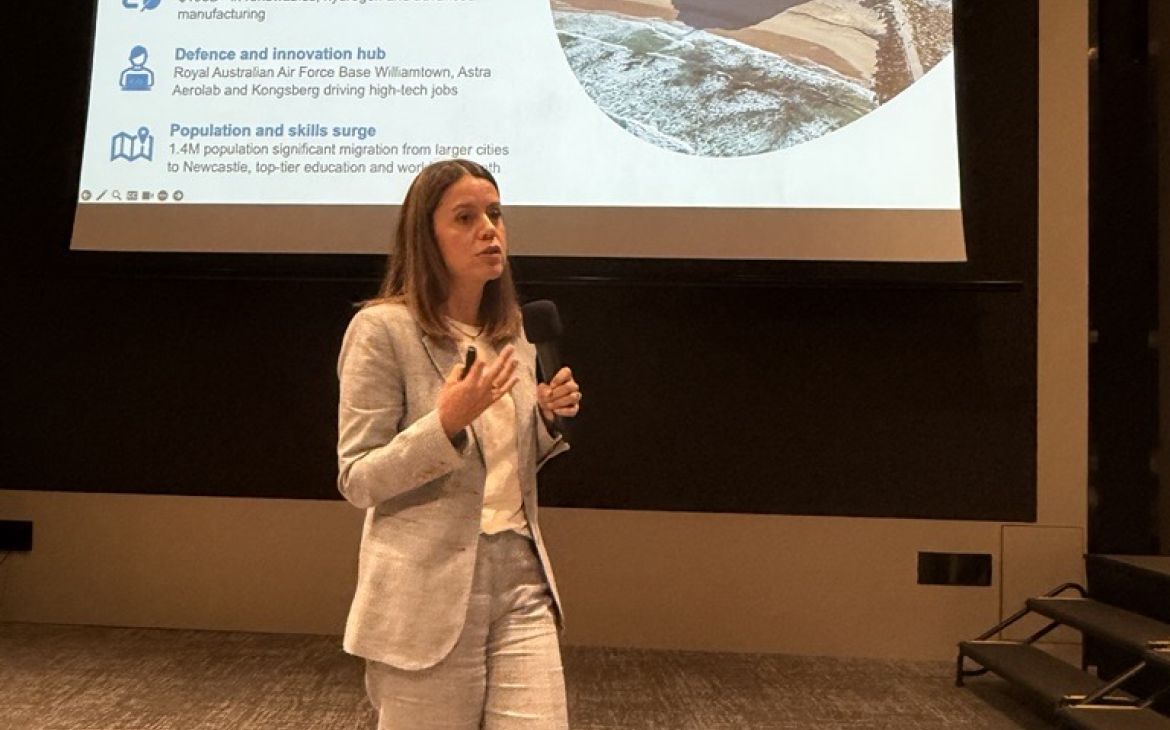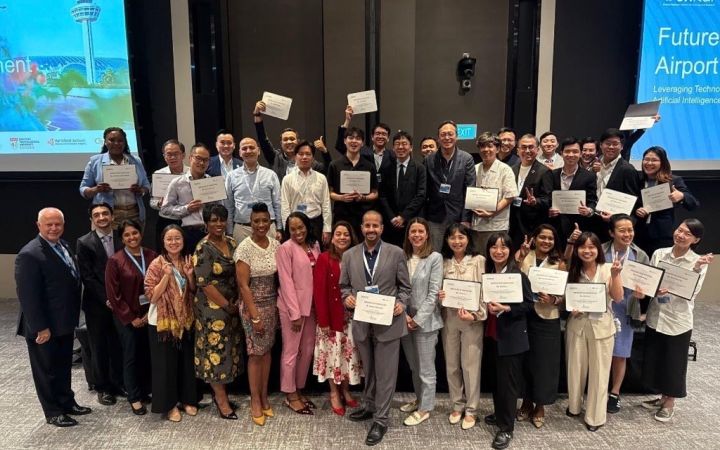Singapore, 24 October 2025 – The United Nations Institute for Training and Research (UNITAR) successfully concluded its fourth regional workshop of 2025 on "Future-Proofing Airport Development: Leveraging Technological Innovations for Enhanced Terminal Operations" in Singapore on 22-23 October 2025. The two-day programme brought together 65 airport professionals from across Asia-Pacific and Middle East to explore cutting-edge technologies transforming airport operations.
Hosted in partnership with the Civil Aviation Authority of Singapore (CAAS), Singapore Aviation Academy (SAA), Singapore Changi Airport, and CIFAL Singapore at Nanyang Technological University, the workshop continues UNITAR's Airports and Economic Development Global Training Programme in collaboration with Hartsfield-Jackson Atlanta International Airport (ATL) and the Georgia Institute of Technology's Enterprise Innovation Institute.
The workshop addressed the convergence of artificial intelligence, automation, biometric systems, and predictive analytics, technologies that offer unprecedented opportunities to enhance efficiency while managing exponential passenger growth. Ms. Charmaine Liu, Director of Singapore Aviation Academy and International Relations at the Civil Aviation Authority of Singapore (CAAS), Singapore, emphasized in her opening remarks the importance of translating technological capability into operational excellence through skilled leadership and strategic implementation.
Mr. Peh Ke-Wei, Vice President of Passenger Development at Changi Airport Group, Singapore, provided insights into Singapore's strategic positioning as an economic driver, demonstrating how integrated planning and technology adoption have enabled Changi to leverage its airport for regional connectivity and investment attraction. His presentation on airports as strategic hubs highlighted the critical balance between technological advancement and passenger experience.
From Atlanta, Ms. Jan Lennon, Executive Deputy General Manager of ATL, USA shared how the world's busiest airport has successfully integrated technology to streamline operations, while Mr. Frank Rucker, Senior Deputy General Manager for Infrastructure, detailed ATL's ambitious ATLNext programme. Ms. Adrienne Ayers, Assistant General Manager for Planning and Development, complemented these perspectives with insights on infrastructure renewal and capacity enhancement.
Digital Transformation in Practice
A standout session featured Mr. Myungwon Min, Manager, Digital Innovation Group, from Incheon International Airport, Republic of Korea, who introduced the Airport Digital Transformation (DX) Maturity Assessment Model – an emerging framework that helps airports measure, improve, and sustain digital capabilities. This systematic approach to digital transformation represents a potential international standard for airports worldwide seeking to benchmark their technological progress.
Mr. Ching-Hock Chua, Associate General Manager of Airport Operations Control at Changi Airport Group, Singapore, provided a deep dive into Changi's technological innovations, including smart terminals, AI-driven resource allocation, and advanced customer engagement strategies. His presentation offered practical lessons for airports at various stages of digital transformation.
Cybersecurity: The Critical Foundation
Dr. Michael Barker, Cybersecurity Expert from Georgia Institute of Technology, USA, led comprehensive sessions on cybersecurity, addressing the unique challenges facing airports in Asia and the Middle East. His interactive "Operation SkyShield" tabletop exercise engaged participants in real-world threat scenarios, emphasizing that in an era of hyper-connected airports, cybersecurity has evolved from a back-office concern to a frontline priority.
"As airports across Asia and the Middle East evolve into smart hubs, the cybersecurity stakes have never been higher," Dr. Barker noted, highlighting threats from ransomware attacks to risks introduced by AI, automation, and third-party integrations.
Regional Perspectives, Global Applications
The workshop served a venue for the Directors of the International Training Centres for Authorities and Leaders (CIFAL) from Atlanta (USA), Bangkok (Thailand), Lebanon, Newcastle (Australia), Saudi Arabia, and Singapore to provide regional insights on airport development and country priorities.
Ms. Burcak Sezer, Executive General Manager from Newcastle International Airport, Australia, who shared her airport's strategic transition from a domestic hub to an emerging international facility. She emphasized how Newcastle's journey required not just infrastructure investment in their new International Terminal, but a complete reimagining of workforce capabilities, stakeholder engagement, and positioning the airport as both critical infrastructure and a consumer-facing brand.
An interactive panel discussion on infrastructure and digital transformation, moderated by Dr. Janice Lee, Deputy Director of CIFAL Singapore, brought together experts including Mr. Tiamher Tan from CAAS's Sector Innovation division, providing participants with practical insights on implementing change at different scales and contexts.
Building Lasting Networks
Ms. Estrella Merlos, UNITAR's Senior Policy Specialist and Deputy Head of the CIFAL Global Network, reflected on the workshop's impact: "Singapore's world-class airport ecosystem provides an ideal laboratory for understanding how technology, policy, and human expertise converge to create next-generation airports. The knowledge exchanged here will enable participants to lead transformation initiatives that promote future-ready airports."
The workshop attracted participants from 10 countries including Australia, Indonesia, Lebanon, Saudi Arabia, Singapore, South Korea, Tanzania, Thailand, and the United States, creating a rich environment for cross-regional learning and collaboration. This diversity of perspectives strengthened discussions on common challenges while respecting regional contexts and constraints.
Looking Forward
As the airport industry navigates post-pandemic recovery while preparing for future growth, the Singapore workshop underscored that technological innovation must be paired with strategic vision, robust cybersecurity, and human-centered design. Participants exchanged experiences on how airports in the Asia-Pacific region are advancing efficiency, sustainability, and service quality to meet growing regional and global demands.
The Airports and Economic Development Global Training Programme continues its mission to build a global network of innovative, economically vibrant airports that serve as catalysts for sustainable development, while fostering airport-to-airport collaboration and knowledge exchange.


